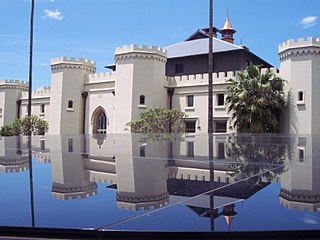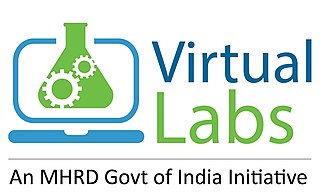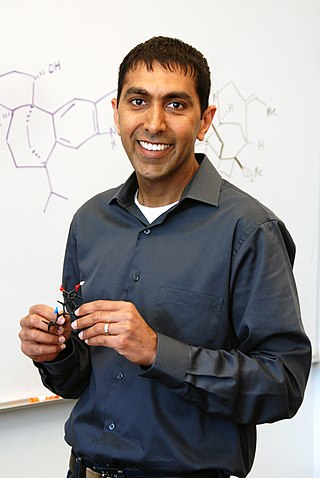
A laboratory is a facility that provides controlled conditions in which scientific or technological research, experiments, and measurement may be performed. Laboratories are found in a variety of settings such as schools, universities, privately owned research institutions, corporate research and testing facilities, government regulatory and forensic investigation centers, physicians' offices, clinics, hospitals, regional and national referral centers, and even occasionally personal residences.
Science education is the teaching and learning of science to school children, college students, or adults within the general public. The field of science education includes work in science content, science process, some social science, and some teaching pedagogy. The standards for science education provide expectations for the development of understanding for students through the entire course of their K-12 education and beyond. The traditional subjects included in the standards are physical, life, earth, space, and human sciences.

The Ivanovo State University of Chemistry and Technology or ISUCT (ИГХТУ) is a public university located in Ivanovo, the administrative center of Ivanovo Oblast, Russia. Research priorities of the ISUCT are concentrated in chemical technology, chemistry and engineering.
The Royal Australian Chemical Institute (RACI) is both the qualifying body in Australia for professional chemists and a learned society promoting the science and practice of chemistry in all its branches. The RACI hosts conferences, seminars and workshops. It is the professional body for chemistry in Australia, with the ability to award the status of Chartered Chemist (CChem) to suitably qualified candidates.

The Conservatorium High School is a public government-funded, co-educational, selective, secondary day school that specialises in music education. It lies on the western edge of the Royal Botanic Gardens, off Macquarie Street, in Sydney's CBD.

Chemistry education is the study of teaching and learning chemistry. It is one subset of STEM education or discipline-based education research (DBER). Topics in chemistry education include understanding how students learn chemistry and determining the most efficient methods to teach chemistry. There is a constant need to improve chemistry curricula and learning outcomes based on findings of chemistry education research (CER). Chemistry education can be improved by changing teaching methods and providing appropriate training to chemistry instructors, within many modes, including classroom lectures, demonstrations, and laboratory activities.

Blagoveschensk State Pedagogical University (BSPU) is located in Blagoveschensk, the administrative center of the Amur Oblast. The city of Blagoveschensk was founded in 1856 and is one of the most important administrative, cultural, scientific, and industrial centers of the Russian Far East region; with more than 220,000 inhabitants. Blagoveschensk is often called “The Gate to China” for its unique location on the border with China. The Chinese city Heihe is located directly across the river Amur, and many Chinese companies work in the Amur region in the timber industry, agriculture, construction, and tourism.

Kabul Polytechnic University is the main center of educating engineers in Kabul, Afghanistan. It was founded on 13 October 1963 as Kabul Polytechnic Institute and is located in 72 hectares of land in Karte Mamourin, North-Western Kabul. In the opening ceremony government officials from both Afghanistan and other countries were present. Since its establishment it has been considered one of the important entities in providing education and training.
Lewis Norman Mander,, FAA, FRS was a New Zealand-born Australian organic chemist. He has widely explored the synthesis and chemistry of the gibberellin class of diterpenes over a 20-year period at the Australian National University (ANU). In particular, he studied the effect of these hormones on stem growth and on the reasons why plant undergo bolting during plant development. The July 2004 edition of the Australian Journal of Chemistry was dedicated to Mander on the occasion of his 65th birthday. He retired in 2002 but remained active at the ANU until 2014. In 2018 Mander was made a Companion in the General Division in the Order of Australia which "...is awarded for eminent achievement and merit of the highest degree in service to Australia or humanity at large". In an interview he gave after winning his award, Mander said that his goal was to improve the efficiency of extracting food from plants with the possibility of reducing food shortages in the future.

University of Kurdistan is the largest university in Iranian Kurdistan Province, located in south of Sanandaj. The University of Kurdistan was ranked as the eighth top university in Iran in academic year 2007-2008 and was ranked as the first top developing university in Iran in academic year 2006–2007.
Qiqihar University is an institution for higher education, founded in 1953 in Qiqihar city of Heilongjiang province in northeast China. Its campus has an area of 1.15 km². It is the only provincial, comprehensive, regular institution of higher learning in the western part of Heilongjiang Province.

Virtual Labs is a project initiated by the Ministry of Education, Government of India, under the National Mission on Education through Information and Communication Technology. The project aims to provide remote access to Laboratories in various disciplines of Science and Engineering for students at all levels from undergraduate to research.

Ida Freund was the first woman to be a university chemistry lecturer in the United Kingdom. She is known for her influence on science teaching, particularly the teaching of women and girls. She wrote two key chemistry textbooks and invented the idea of baking periodic table cupcakes, as well as inventing a gas measuring tube, which was named after her.

Kyrgyz-Turkish Manas University was founded according to an agreement between the governments of the Republic of Turkey and the Kyrgyz Republic about establishment of Kyrgyz-Turkish Manas University in Bishkek, which was signed in Izmir on September 30, 1995. The agreement was afterward approved by the competent authorities of both countries. The university began operation in the 1997-1998 academic year.

The Institute of Chemistry Ceylon is the successor to the Chemical Society of Ceylon and was established in the year 1971 for the general advancement of the science and practice of chemistry. It is a not-for-profit organization, learned society catering to the Chemical Sciences as well as a professional, qualifying and examination body looking after and responsible for the maintenance and enhancement of the profession of Chemistry in Sri Lanka. It is the oldest such body in any branch of the basic sciences in Sri Lanka. The Golden Jubilee of the Institute was held in 1991 & the Diamond Jubilee in 2001. The Institute of Chemistry Ceylon was incorporated by Act of Parliament No. 15 of 1972.

Neil K. Garg is currently a Distinguished professor of chemistry and holds the Kenneth N. Trueblood Endowed Chair at the University of California, Los Angeles. Garg's research is focused on the chemical synthesis of organic compounds, with an emphasis on the development of new strategies for the preparation of complex molecules possessing unique structural, biological, and physical properties. His group has made breakthroughs in catalysis, especially strong bond activation of esters and amides using nickel catalysts, and in the understanding and utilization of strained intermediates, such as arynes, cyclic alkynes, and cyclic allenes. His laboratory has completed the total syntheses of many natural products, including welwitindolinones, akuammilines, and tubingensin alkaloids. Garg is a co-Founder of ElectraTect, Inc.,
Elizabeth Joy New is an Australian chemist and Professor of the School of Chemistry, University of Sydney. She won the 2018 Australian Museum 3M Eureka Prize.
Peter Jonathan Rutledge is a New Zealand chemist and professor at the School of Chemistry, University of Sydney. His research has focused on drug development for tuberculosis, antibiotics, and metal sensing. He has engaged in some research activity on catalysis.
Jennifer Louise Slaughter is a British chemist and a Senior Lecturer in the Department of Chemistry at the University of Manchester. Her research is based on chemistry education and academic writing, specifically on laboratory chemical education, science communication, teaching and scholarship.

Deanna Michelle D'Alessandro is an Australian chemist who is a Professor and Australian Research Council Future Fellow at the University of Sydney. Her research considers fundamental aspects of electron transfer in molecular coordination complexes and in nanoporous materials, and the development of metal–organic frameworks for environmental applications including carbon dioxide capture and conversion.












